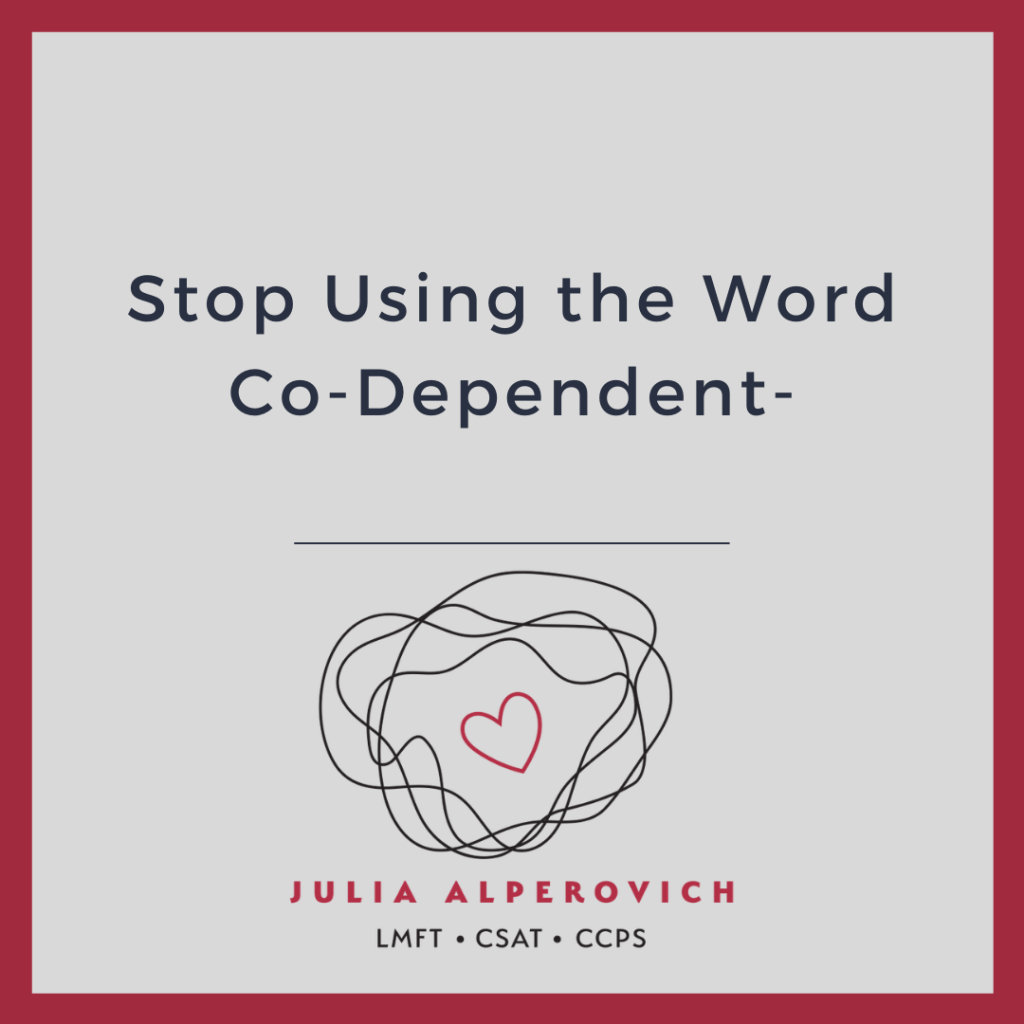There are so many words in the English language that are misused or overused. The words or phrases “honestly”, “no offense”, “actually”, “ironic” are some examples. However, I hear the word “codependent” being used incorrectly on a regular basis. Many clients use this word in session with me assuming they are providing a clinical description of their behavior and attachment patterns. They are partially correct. What they are providing me with is a demonstration of their self-esteem.
The word “codependent” has a negative connotation, and it implies self-blame for dysfunctional patterns. Merriam-Webster broadly defines codependency as the dependence on the needs of or control by another. Oxford defines codependency as a situation in which two people have a close relationship in which they rely too much on each other emotionally, especially when one person is caring for the other one. Collins defines codependent as psychologically influenced or controlled by, reliant on, or needing another person who is addicted to drugs, alcohol, etc. All of these definitions are descriptions of a psychological problem or a flawed manner of relating to another person. When a person defines him or herself as codependent, I hear them talking about being flawed or having something wrong with them.
In the case of partners of sex addicts who use this term to describe themselves, I often wonder if they have been exposed to an archaic view of partners of sex addicts in which they are blamed for being overly dependent on the addict. For the record, this view is a form of blaming the victim, is patronizing, and is not always accurate. Partners of sex addicts usually do not get involved with the addict knowing they have an addiction nor consenting to take care of them in their addiction. It is usually something that is discovered or disclosed later in the relationship, and is extremely painful and traumatic for partners. To have a partner of a sex addict believe that they somehow perpetuated or allowed the addict to engage in his or her addiction is damaging and can cause further trauma to the partner.
When a sex addict describes him or herself as codependent, it implies that they have a dysfunctional pattern of relating to others. They may, in fact, have a dysfunctional pattern, but the term “codependent” falls short in it’s specificity of where exactly the dysfunction lies or of its cause. When addicts refer to their partners as codependent, it is an indirect form of blaming their partners for permitting the addiction to continue. All of these uses of the term fail to clearly explain the unhealthy dynamics and root causes.
I have asked numerous people including my clients and colleagues about how they define “codependency”. Each response was slightly varied. Some of the definitions focused on setting and maintaining boundaries, others talked about self-esteem, others mentioned people-pleasing, and others named obsession, control, reactivity, poor communication, and denial. All of these may be associated with codependency, but what combination of them is a person referring to when they use the term to describe themselves? Which of these has the biggest impact or causes the biggest impairment for the person or for their relationship? There is no way to know unless we dive deeper into each of these factors.
For this reason, and for the sake of accurate assessment and treatment, I would like to plead with both clinicians and clients to refrain from using the umbrella term “codependent”. Let’s move the conversation in the direction of the specific symptoms, behaviors, dynamics, and communication patterns. We need to talk more about the narratives we have internalized from our families of origin and cultures about how to function in relationships and in various roles. We also need to talk about how traumas and insecurities have influenced these patterns. There is a tremendous amount of insight to be gained from examining these specific systems of interaction. In reducing their patterns to the specific components, people are often able to narrow down the areas in which they need to focus rather than feeling overwhelmed or hopeless with having a broad underlying pervasive issue that causes them distress. It is much easier to tackle a larger problem by addressing its smaller parts than it is to try to fix the entire problem from all of its angles at once.
Dealing with unhealthy relationships, betrayal, addiction, and trauma is already a sensitive undertaking. We have to be mindful of our wording throughout the entire process of recovery. Words hold power and can inhibit our processes of growth and healing. Also, especially when working with compulsive sexual behaviors and the trauma of partners who have been betrayed, we want to be very careful to not label something incorrectly. That means we have to be careful with labeling something as an addiction and with labeling something as codependency. Let’s use our words in a productive way and eliminate ambiguity by starting with elimination of the word “codependent”.


